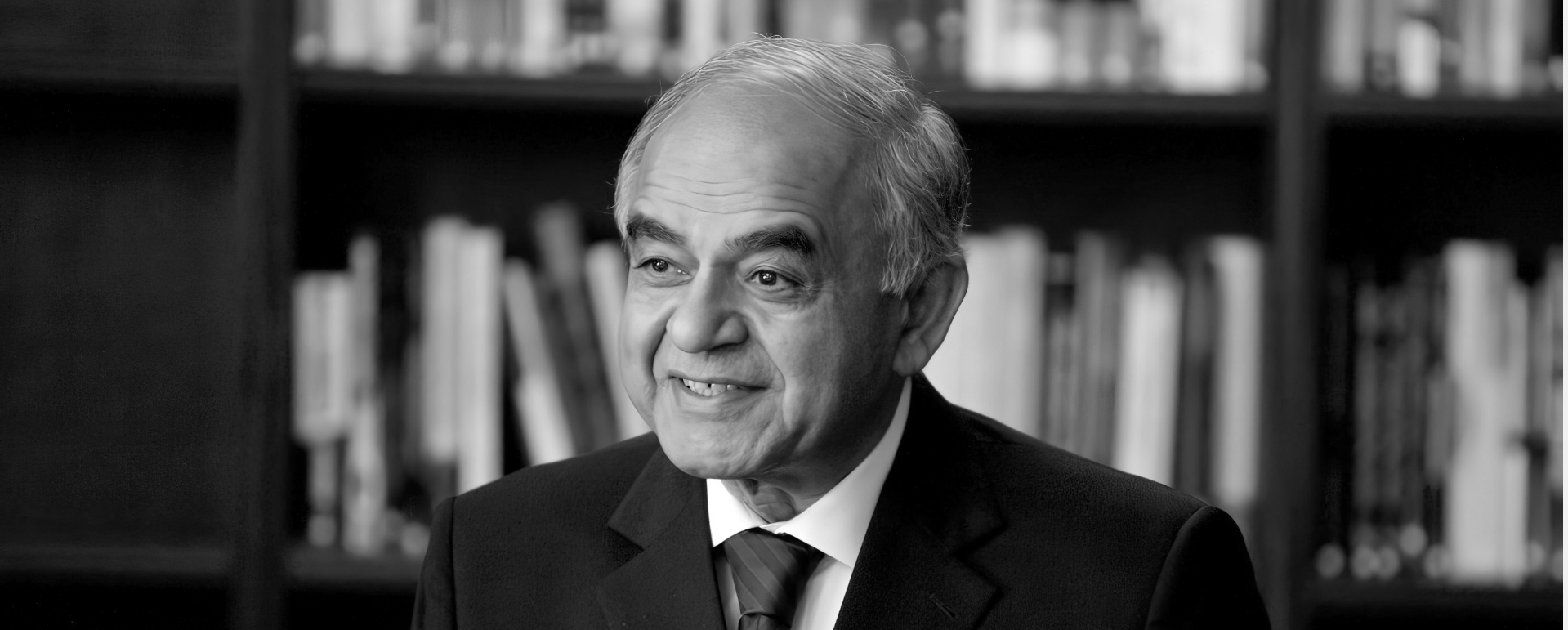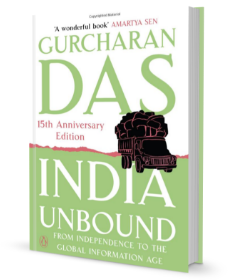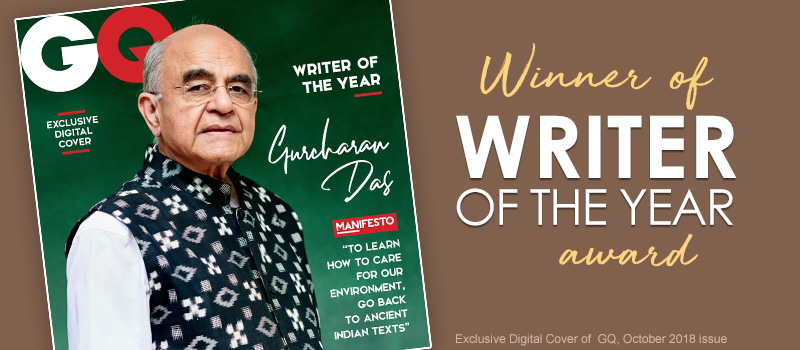

India Unbound: from Independence to the Global Information
-
1) "Something tremendous is happening in India, and Das, with his keen eye and often elegant prose, has his finger firmly on the pulse of the transformation. His stories enliven what could easily have been a dull piece of economic history. Das had a ringside seat at the events he describes, and the result is an engaging account that moves easily from the big picture to the telling anecdote. Part memoir, part journalism, and part history, the book begins shortly before independence and continues until the new millennium. "The theme of this book," he writes, "is how a rich country became poor and will be rich again."
-- The New York Times, March 25, 2001. -
2) "The big story is that this is wonderful book. India Unbound is a great mixture of memoir, economic analysis, social investigation, political scrutiny and managerial outlook being thrown into the understanding of India. It is not easy for a book of this kind to work, but in this case it actually does. In terms of the temper of the book, the fact that Gurcharan Das is happier with the world does makes a difference. He is both critical as well as optimistic and I think that combination works well. There is a positiveness of approach that breathes through every page, and the view of India that emerges is optimistic but it is not unrelated to criticisms of early periods, [the decades after Independence], and at one or two places I would even say that he may have over-criticized things. "
-- Amartya Sen, Nobel Prize winner, at the Nehru Centre, London, 7 May, 2002 -
3) "India Unbound is a quiet earthquake that shook faraway shores long before its shockwave reached Britain. [Its] conclusion is that in the next two decades India will become the third largest economy, after the US and China, …[and] two industries, information technology and agriculture, will lift India out of poverty. It talks of an India where teenage tea-shop assistants work to save money for computer lessons…[and] says that if the poor get rich and a few people get filthy rich, that is better than worrying about the distribution of wealth and no one getting rich. Amartya Sen, the Nobel Prize-winner was so impressed he asked Das to start a "secular, rightwing party" modelled on Britain's Tories in India."
--The Guardian, London, June 11, 2002 -
4) "One of the most readable and insightful books to appear on India's tortuous economic path…since shaking off British rule"
-- Business Week, New York, April 16, 2001. -
5) "The change in India since economic liberalization in 1991 has been astonishing, and the pace of it picks up every day. Any visitor to India must ask how it came about and where it might lead. On a recent visit—after several years – I found a book which gave a vivid and persuasive explanation of the transformation all around me. India Unbound: from Independence to the global information age by Gurcharan Das is a mixture of memoir and social and economic inquiry, written with great energy, personal knowledge and clarity by a man who began his commercial career selling Vicks VapoRub to India villages (an excellent chapter). It isn't perfect – it has to my mind too much pro-market gusto in the analysis and a touch of Samuel Smiles in the story – but I would firmly recommend it to any visitor to India as a key guide to its recent past."
-- New Statesman, London (by Ian Jack), 30 January, 2006. -
6) The revised edition of Mr Das's book, India Unbound, is at the top of the country's best-seller list for non-fiction, tapping into a vein of renewed self-confidence and national pride that is itself a central theme of his study. Part memoir, part history, part travelogue, part polemic, India Unbound dissects the failures of the country's Nehruvian socialist experiment and vividly describes the changes that are transforming the daily lives and outlooks of the country's 1bn people. Mr Das's central argument is that India's market reforms, which began in 1991, are proving as revolutionary as Deng Xiaoping's embrace of capitalism in China in 1979--it is just that they are occurring more slowly and have so far failed to generate as much outside interest… In fits and starts, he argues, India's liberalising reforms are slowly unleashing the country's "animal spirits" and will eventually lead to its emergence as one of the world's great economic powers. By 2025, he predicts, India could have increased its share of global output from 6 per cent to 13 per cent, making it the third largest economy in the world. While India may never roar ahead like the Asian tigers, he argues, it can at least advance like a wise elephant, moving steadily and surely, pausing occasionally to reflect on its past and to enjoy the journey.
--Financial Times, London Aug 21, 2002. -
7) "The strength of his inquiry lies in its castigation of those who inherited the running of India from the British. He is commendably scathing about Nehru and his daughter Indira Gandhi, who had her father's hubris and contempt for businessmen but not a trace of his erudition… In most developed democracies, someone like Mr. Das would be a legislator or a cabinet minister. The author regards economic growth as the only way to strengthen Indian democracy. ...[and] his optimism is potent when he says, 'We have good reasons to expect that the lives of the majority of Indians in the 21st century will be freer and more prosperous than their parents. Never before in recorded history have so many people been in a position to rise so quickly.'"
--The Wall Street Journal, March 19, 2001. -
8) "Informative, entertaining, and basically correct about India's need to embrace capitalism more wholeheartedly, for all the costs and risks."
--The Economist, February 17, 2001 -
9) "The strength of his inquiry lies in its castigation of those who inherited the running of India from the British. He is commendably scathing about Nehru and his daughter Indira Gandhi, who had her father's hubris and contempt for businessmen but not a trace of his erudition… In most developed democracies, someone like Mr. Das would be a legislator or a cabinet minister. The author regards economic growth as the only way to strengthen Indian democracy. ...[and] his optimism is potent when he says, 'We have good reasons to expect that the lives of the majority of Indians in the 21st century will be freer and more prosperous than their parents. Never before in recorded history have so many people been in a position to rise so quickly.'"
--The Wall Street Journal, March 19, 2001. -
10) "For American readers…this book will come as a welcome surprise…it could be an eye-opener to readers unfamiliar with the radical transformations currently under way in the subcontinent".
--The Washington Post Book World, March 11, 2001 -
11) "When George Bernard Shaw famously wrote that 'if all the economists in the world were laid end to end, they would never reach a conclusion,' he clearly didn't have Das' book in mind. Das weaves accessibly written history, thumbnail biographies of legendary Indian industrialists and entrepreneurs, his own experiences as a young executive building up the Vicks brand in the Indian heartland and accounts of Kafkaesque encounters with bureaucracy, into a book that traces 'the struggle of one-sixth of humanity for dignity and prosperity' and comes to pretty clear conclusions. Das is, in tempered and measured prose, scathing…Having constructed a comprehensive indictment of India's economic failures, Das is optimistic about the liberalization that has opened the economy in the 1990s. He sees India on the brink of a great transformation, fuelled by the Internet that will rival Japan's after the Meiji Restoration…Das writes in an engaging style, sprinkling his text with a well-chosen array of quotations. There are layman-friendly discussions of economic theories of poverty, and his arguments are leavened with a close reading of economic texts, both classic and contemporary. But what shines through is the telling anecdote, the personal example, the remembered conversation."
--Los Angeles Times, (by Shashi Tharoor), March 22, 2001 -
12) "Remarkable...heads and shoulders above the customary books .... This story, so much more persuasive and effective…[as] Das traces his life as a journey headed in the same direction as the business life of his country, an almost literary scheme that is unusually effective...The issues of business vs. private enterprise played against the somewhat parallel questions of modernity vs. tradition and nationalism against cosmopolitanism…. This elegant essay has something for everyone."
--St. Louis Post-Dispatch -
13) "Gurcharan Das has written a paean to liberalisation (India Unbound, Viking)-- arguably the most readable book on the reforms of the 1990s. Gurcharan is a magical writer and a great story-teller; his account of the reforms is so upbeat that even I thought we had accomplished something."
--Business Standard, November 28, 2000 -
14) "Gurcharan Das's view of the recent history of India, particularly the socio-politico-economic history of the country is unabashedly right. His keen eye and sharp sense of sound captures the panorama of the last 50 years of Indian history in his own way. . . both fascinating and interesting . . . "India Unbound" keeps your interest in top gear throughout the book."
--Business Line, June 8, 2000 -
15) "His account of the behind the scenes activity is illuminating. . . "India Unbound" is bound to become an essential component of the reading list for anyone interested in the contemporary Indian economy."
--The Hindu, June 18, 2000. -
16) "The former CEO of Procter and Gamble India paints a rich canvas of the new India. . . there are great moments of insight."
--Sunil Jain, Indian Express, May 14, 2000. -
17) "This is a great book to read…what permeates the book is the optimism of the million reformers who have been unshackled."
--Bibek Debroy, Outlook, May 22, 2000. -
18) "Why has a country as bountifully blessed as India achieved so little in a half century of freedom? Gurcharan Das provides a of the possible reasons in India Unbound…Not often does one come across a former CEO of a major organization and currently head of a venture capital fund, who is also well-read in a wide range of subjects, ranging from economics to philosophy to poetry. And if one does come across them on rare occasions, not many can wield a pen as dexterously as Das does."
--V.S. Mahesh, Business India -
19) "Gurcharan Das is by any standard an amazing man…India Unbound is an education by itself. Gurcharan Das goes back and forth into history, politics, social changes as and when the situation calls for, and speaks more about the world around him than about himself…Even when he is critical of Jawaharlal Nehru's policies he is appreciative of his sentiments."
--M.V. Kamath, The Daily Sunday.
